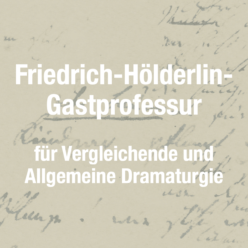Die Professur für Theaterwissenschaft besetzt mit Unterstützung des DAAD und des International Office der Goethe-Universität Frankfurt am Main regelmäßig eine Friedrich Hölderlin-Gastprofessur für Allgemeine und Vergleichende Dramaturgie mit internationalen Gästen, die in ihrer Arbeit Theorie und künstlerische Praxis auf vorbildliche Weise mit einander verbinden. In den letzten Semester waren unter anderen der Theaterwissenschaftler Freddie Rokem (Tel Aviv), der Wissenschaftler Esa Kirkoppelto (Helsinki), Theaterwissenschaftler Dr. Markus Wessendorf (Mānoa), Theatermacherin Dr. Lina Majdalanie (geb. Saneh), die Wissenschaftlerin Annalisa Piccirillo (Neapel), der Regisseur und Theaterwissenschaftler Tore Vagn Lid (Oslo), der Theaterwissenschaftler Khalid Amine (Marokko), die Theaterwissenschaftlerin Kélina Gotman (London) und der Theaterwissenschaftler Enrico Pitozzi (Bologna) in Frankfurt zu Gast.
Leitung:
Prof. Dr. Nikolaus Müller-Schöll
Goethe-Universität
Institut für Theater-, Film- und Medienwissenschaft
Norbert-Wollheim-Platz 1
60323 Frankfurt am Main
theater@tfm.uni-frankfurt.de
